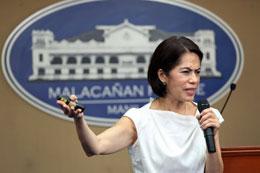A Canadian era for mining in Philippines

The Philippines, a global mining hotspot marred by many disasters from toxic leaks to mudslides, will adopt Canada’s mining sustainability standards to improve engagement with civil society and enhance transparency and accountability.
It becomes the first Southeast Asian nation to adopt Canada’s Towards Sustainable Mining (TSM) initiative but the local industry has warned it expects growth to be held back in 2018.
The Philippines' mining industry was hamstrung by the country's previous environment secretary Regina Lopez, who implemented a ban on openpit mining and closed or suspended operations on environmental and social grounds during her controversial 10 months in office which ended last May.
She was replaced by Roy Cimatu.
Following a TSM signing ceremony, Chamber of Mines of the Philippines (COMP) chairman Gerard Brimo told local media there would be no growth until issues including the openpit ban were resolved.
The Mining Association of Canada (MAC) developed TSM as a mining sustainability standard and it has also been adopted by mining associations in Finland, Argentina and Botswana in the past two years.
"There is so much that minerals development, done responsibly, can contribute to the economy of a nation and to the welfare of mining communities, as shown by numerous examples in the Philippines," Brimo said in a statement.
"We have heard no less from our president Rodrigo Duterte that if you follow Australian or Canadian standards, you are OK," he told Bloomberg, a comment retweeted by COMP.
MAC and its members launched TSM in 2004. Implementation of the program is mandatory for all MAC members' Canadian operations, but many voluntarily apply it to their international sites. MAC freely shares TSM with other countries seeking tools to improve the environmental and social performance of their mining industries, including engagement with civil society and enhanced transparency and accountability.
TSM requires mining companies to annually assess their facilities' performance in key areas, including tailings management, community outreach, safety and health, biodiversity conservation, crisis management, and energy use and greenhouse gas emissions management. The results are freely available to the public and are externally-verified every three years to ensure what has been reported is accurate.
"It is our privilege to share our tools and expertise in sustainable mining practices with the world. With the Philippines' adoption of TSM, we're proud to say that our made-in-Canada program is now in five countries on five continents. We applaud the Chamber of Mines of the Philippines for taking this important step forward as it works to enhance its industry's environmental and social performance," stated Pierre Gratton, President and CEO, MAC.
The last few years have been difficult for the Philippine mining industry after the government decided to overhaul the entire mining tax system, placing a moratorium on all new investment until a new tax law was passed.
The Philippines Department of Environment and Natural Resources (DENR) shut down more than half of all operating mines last year under the helm of former Secretary Gina Lopez.
Lopez said its audit found “serious environmental violations” in 23 of the country’s 41 mines. The department also cancelled contracts for 75 mining projects still in their exploration stages. The projects are located in watersheds; Lopez said they never should have been approved to begin with.
Miners went up in arms, not only about the orders, but the way in which they were being carried out. They claimed their supposed violations hadn’t been made clear and argued that they should be given the chance to address any issues.
Much of their criticism focused on Lopez herself, a staunch environmentalist who famously claimed she was so against mining that she didn’t even keep a pot in her house. She justified keeping the findings confidential saying they are “too complicated”. She has also admitted her own audit team only recommended fining the companies, but she felt that was not enough.
After Filipino lawmakers rejected Lopez’ appointment, the Duterte administration appointed
former Armed Forces of the Philippines (AFP) retired general Roy Cimatu as environment secretary.
Cimatu who was the former special envoy for Overseas Foreign Workers and refugees, served as chief of staff of the military in 2002.
Philippines is a treasure trove of minerals
The Philippines is the fifth most mineral-rich country in the world for gold, nickel, copper, and chromite. It is home to the largest copper-gold deposit in the world.
The Mines and Geosciences Bureau (MGB) has estimated that the country has an estimated $840 billion worth of untapped mineral wealth, as of 2012.
About 30 million hectares of land areas in the Philippines is deemed as possible areas for metallic minerals. According to the Mines and Geosciences Bureau (MGB), about nine million hectares of land areas is identified as having high mineral potential.
The Philippines metal deposit was estimated at 21.5 billion metric tons and non-metallic minerals are at 19.3 billion metric tons, as of 2012.
In 2016, there were 236,000 workers in the Philippine mining industry.
The mining industry’s contribution to the country’s GDP is at 0.6 percent in the same year. The contribution of minerals and mineral products to the country’s total exports is at 4 percent and 0.3 percent for non-metallic mineral manufacturers.
As of August 2016, mining companies had already committed P13.1 billion for the development of their host and neighboring communities under their Social Development and Management Programs.
As of September 2016, there were about 40 metallic mines and 62 non-metallic mines operating in the country. There were a total of 1,473 mining applications under process in the country as of 2016.









